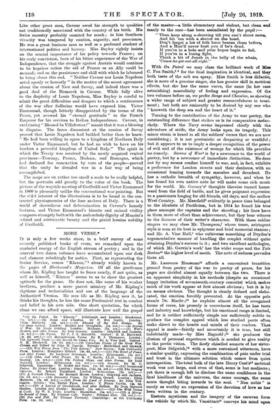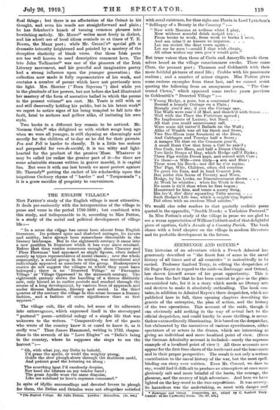MORE VERSE.* IT is only a few weeks since, in
a brief survey of some recently published books of verse, we remarked upon the unabated energy of the English stream of poetry ; and in the interval two dozen volumes have accumulated upon our desk and clamour rebukingly for notice. First, as representing the Senior Service, comes "Klaxon," already widely known in the pages of Blackwood's Magazine. Of all the gentlemen whom Mr. Kipling has taught to fence nearly, if not quite, as well as himself, "Klaxon" seems to us to show the greatest aptitude for the game. He does not, like some of his weaker brethren, produce a mere parrot mimicry of Mr. Kipling's rhythms and technicalities and use of the language of the Authorized Version. He sees life as Mr. Kipling sees it, he thinks his thoughts, he has the same Puritanical zest in combat and belief in his own side. One short quotation, for which alone we can afford space, will illustrate how well the gospel
• (1) On Patrol. By "Klaxon." Edinburgh and London : Blackwood. 16s. net.1-(2) Songs and Chanties. By C. Fox Smith. London : Elkin Mathews. [6e. net.]-(3) Rhymes of Me Red Ensign. By the same author. London: Hodder and Stoughton. [5s. net.]-(4) Sorrow of War. By Louis Golding. London : Methuen. [5s. net.]-(5) War's &them, and other Verses. By Ivor Gurney. London : SIdgwick and Jackson, (3s. net.1-(6) Poems. By 0. J. S. Mansfield. Oxford : B. H. Blackwell. [As. 6d. net.1-(7) Mesopotamian Verses. By B. J. Thompson. London : The Epworth Press.-(8) Round the Camp Fire. By .A. Yine Hall. Oxford : B. H. Blackwell. (9s. 6d, net.]-(9) Canadian Poems of the Great War. Chosen and Edited by John W. Garvin. Toronto : McClelland and Stewart. -(10) War Poems from " The Yale Review." New Haven: Yale University Press. London: Humphrey Milford. [4s. 6d. net.]-(11) The Heart of Peace, and other Poems. By Laurence Housman. London : Heinemann. [55. net.] -(12) Odes, and other Poems. By It. C. Matte, LL.D. London : John Murray. [5s. net.]-(13) The Sailing Ships, and other Poems. By Enid Bagnold. London: Heinemann. [5s. net.]-(14) Sonnets. By M. C. SldgwIck. Cambridge : W. Helfer and Sons. [1s. Ad. net.]-(15) Occasional Poems. By Henry Cust. London : Simpkin. [10s. 64.. net.]-(16) The Singing Caravan, By Robert FansIttart. London : Heinemann. [68. net]- (17) d Cornish Chorus. By Bernard Moore. London : Sidgwick and Jackson. [28. 6d. net.]-(18) Dramatic Vistas. By William Gerard. London : Elkin Mathews. [Ss. 6d. net3-(19) From the Land of Dreams. By John Tod- hunter. Dublin : The Talbot Press. London: T. Fisher Unwin. [4s, 64.. net.]-(20) d Legend of Glendalough, and other Ballads. By Dora Sigerson Shorter. London and Dublin Msunsel. (1s. net.1-(21) The Wild Swans at Cools. By W. B. Yeats. London : Macmillan. [55. net.1-(22) A Merry- Go-Round of Song. By Norman Gale. Rugby : Norman Gale. [6s. net.]-___ (23) Fen and Felt. By Thomas Thornely. Cambridge at the University Press. (43. Od. net.]
of the master-a little elementary and violent, but clean awl manly to the core-has been assimilated by the pupil :- " Then keep along a-shooting till you can't shoot more, And hit 'em with a shovel on the head.
Don't forget a lot of folk have beaten them before, And a Hun'll never hurt you if he's dead.
If you're in a hole and your hopes begin to fail, If you're in a losing fight,
Think a bit of Jonah in the belly of the whale, 'Cause-he-got-out-all-right."
With On Patrol we may class the brilliant work of Miss C. Fox Smith,2 3 for the final inspiration is identical, and they both taste of the salt sea spray. Miss Smith is less didactic,
she is more of a genuine singer, she has greater skill in metrical effects, but she has the same verve, the same (in her case astonishing) masculinity of feeling and expression. Of the
two volumes before us, we prefer Songs and Chanties, as showing a wider range of subject and greater resourcefulness in treat-
ment ; but both are eminently to be desired by any one who " k.noweth the deep sea and the heart of it."
Turning to the contribution of the Army to war poetry, the outstanding difference that strikes us is its comparative melan- choly. Where the Navy seems impressed chiefly with the adventure of strife, the Army looks upon its tragedy. Th31 minor strain is heard in all the soldiers' verses that we are now considering ; it is not pessimistic or despairing or wrathful ; but it appears to us to imply a deeper recognition of the power
of evil and of the existence of wrongs for which life provides no remedy. Sorrow of War4 is by a newcomer to the world of poetry, but by a newcomer of immediate distinction. He does
not by any means confine himself to war, and, in fact, exhibits a preference for London streets and their denizens, with an occasional leaning towards the macabre and decadent. He has a catholic breadth of sympathy, however, and when he has found his own native note he will make some rich music
for the world. Mr. Gurney's5 thoughts likewise turned home- ward from the field of battle, and he gives poignant expression to a passionate longing for old friends, old days, and the mellow West Country. Mr. Masefield5 evidently in peace time belonged to the idealists of Pacificism, but in 1914 he found his true place amongst the captains and the shouting ; his lines have in them more of effort than achievement, but they bear witness to the fineness of their writer's character. With these soldier singers we may class Mr. Thompson,7 whose tense, astringent
style is seen at its best in epigrams and brief memorial stanzas ; and Mr. A. Vine Hall,° who cultivates something of Dryden's argumentative manner of handling the couplet without quite attaining Dryden's success in it ; and two excellent anthologies, of which Mr. Garvin's work° has the wider scope and the late Review" the higher level of merit. The note of sadness pervades them all.
Mr. Laurence Housman" affords a convenient transition ground from poetry of the war to poetry of peace, for his pages are divided almost equally between the two. There is
an apparent simplicity in his methods (despite an occasional happy imitation of seventeenth-century conceits) which makes much of his work appear at first almost obvious ; but it is by
no means obvious. The thought is clearly defined and elabo-
rated, the emotion forcibly presented. At the opposite pole stands Dr. Macfie ;12 he exploits almost all the recognized forms of verse, his prosody is correctness itself, he has taste and industry and knowledge, but his emotional range is limited, and he is neither sufficiently simple nor sufficiently subtle to produce the complex appeal which less studied poets often. make direct to the hearts and minds of their readers. That appeal is made-faintly and uncertainly it is true, but still indubitably made-by Miss Bagnold ;13 she produces the illusion of personal experience which is needed to give reality to the poetic vision. The finely chiselled sonnets of her sister- poet, Miss Sidgwick,14 with a more restrained utterance, have a similar quality, expressing the combination of pain under trial
and trust in the ultimate solution which comes from quiet introspection. The total bulk of the late Henry Oust's° metrical work was not large, and even of that, some is but mediocre ; yet there is enough left to disclose the same confidence in the final kindliness of the universe, the same courage, the same acute thought biting inwards to the souL "Non nobis " is
surely as worthy an expression of the devotion of love as hag been written in the century.
Eastern mysticism and the imagery of the caravan form the vehicle by which Mr. Vensittart16 conveys bill mind upon final things ; but there is no affectation of the Orient in his thought, and even his words are straightforward and plain ; he has Sohubert's knack of turning common phrases into bewitching melody. Mr. Moore" writes most freely in dialect, and his adroit use of local idiom reminds us at times of T. E. Brown, the Manx poet ; while Mr. Gerard's." special gift is dramatic intensity heightened and pointed by a mastery of the deceptive elasticity of blank verse. Our three Irish poets are too well known to need descriptive comment here. The late John Todhunter" was one of the pioneers of the Irish Literary movement, and his graceful and imaginative poetry had a strong influence upon the younger generation ; the collection now made is fully representative of his work, and contains a number of poems which have not previously seen the light. Mrs. Shorter (" Dora Sigerson ") died while yet in the plenitude of her powers, but not before she had illustrated her mastery of the form of narrative ballad in which the poems in the present volume20 are cast. Mr. Yeats is still with us and still deservedly holding his public, but in his latest work2-1 we regret to notice signs of his being tempted to fall into the fault, fatal to authors and golfers alike, of imitating his own style.
Two books in a different key remain to be noticed. Mr. Norman Gale,22 who delighted us with cricket songs long ago when we were all younger, is still rhyming as charmingly and merrily for the children of to-day as he did for their parents. Fen and Pell is harder to classify. It is a little too serious and purposeful for vers-de-societe, it is too witty and light- hearted for the product of the pensive -Muse. Whatever it may be called (or rather the greater part of it—for there are some admirable stanzas written in graver moods), it is capital fun. But were it with our last breath we must protest against Mr. Thomely22 putting the cachet of his scholarship upon the iniquitous Cockney rhyme of " harder " and " Torquemada " ; it is a gross sacrifice gf propriety to convenience.



































 Previous page
Previous page